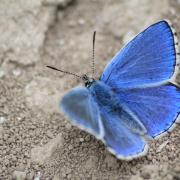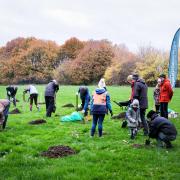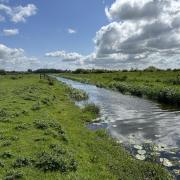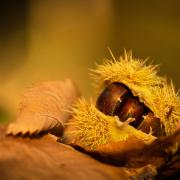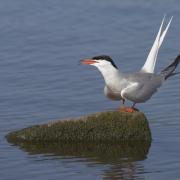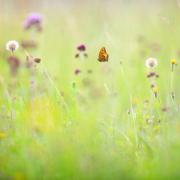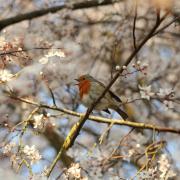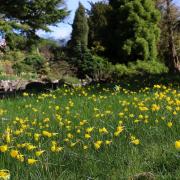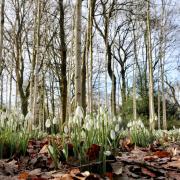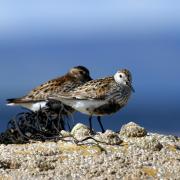Eight great, and easy, resolutions that will help make 2018 your greenest year yet. Words by Katie Piercy from Cheshire Wildlife Trust

Environmental issues are in the headlines. From climate change, to the ongoing decline of hedgehogs and the drop in insect populations by a staggering 75% in 25 years across several global locations, we’re all becoming more aware of our impact on the environment. But for most of us the question of what we can do remains unanswered. So here are a few simple New Year’s resolutions we can all sign up to which will help 2018 be a greener year.
1. Go peat-free
Did you know the peat we use in our gardens comes from internationally important wildlife sites? Across Europe, bogs, home to golden eagles, curlews and short-eared owls are dug up for commercial peat. In the UK, we’ve lost 94% of our rare lowland raised bogs in the last 100 years. Now peat extraction is moving to untouched corners of Europe, once peat has been extracted here these sites will no longer be suitable for these rare and wonderful species. So choose peat-free compost and protect wildlife.

2. Reuse and recycle
Make sure you take the opportunity to reuse and recycle whenever you can. A lot of waste being sent to landfill is recyclable and by making the effort to use council schemes properly we can all save natural resources and reduce emissions of greenhouse gas. Perhaps you can even re-think your use of items too – don’t automatically hit that print button, re-fill your own water bottle, and pass on unwanted gifts and clothes to the local charity shop.

3. Let it be wild
There are many benefits to allowing patches of our gardens, towns and countryside to stay untouched and wild. For example did you know many insects sleep away the winter under rotten bark, or in the stems of dead flowers? Many mammals and amphibians too like a nice untouched patch of dead leaves and bramble to safely sleep away the colder months. So why not choose a corner of your garden to let go wild, or even see if your place of work has a green patch which could be left untouched?
4. Be an eco-shopper

Just by changing our shopping habits we can help protect rainforests, save whales and fight climate change. The items we buy can have a massive effect on the world around us. By reducing the amount of plastic in our shopping basket through buying loose fruit and vegetables and selecting non-plastic packaging, we can decrease the amount of rubbish which may end up in our seas. By buying biodegradable washing up liquids, shampoos and soaps we can stop chemicals, used in conventional products, from polluting our rivers. Some brands also put money back into protecting the planet by planting trees or giving some of their profits to conservation charities. Every shopping basket switch you make supports a greener future.
5. Go organic
Did you know that the organic label means that significantly less (or in some cases no) pesticides or non-organic fertilisers were used in the production of an item? That means organic farms are likely to have healthier insect populations, and more of the birds and mammals which feed on them. While buying organic can sometimes stretch the purse, you can go organic in other ways. Non-organic slug pellets may harm hedgehogs as the active chemical (metaldehyde) accumulates within their bodies as they eat the poisoned slugs. The same is true of rat poisons and their predators such as owls and other birds of prey. Organic methods of control can still help keep pests away while stopping other wildlife species from suffering.
6. Keep it native
Did you know that non-native species (species from outside the UK) often support less of our own wildlife? For example rhododendron flowers are actually poisonous to many of our native bee species, meaning they don’t harvest the pollen from them. Non-native trees too, like sycamore, spruce and eucalyptus, support fewer fungi and insects than our native oak, ash and birch. Not only do they sustain fewer species, but our ecosystems are not adapted to cope with them. Many non-native species can become invasive and take over large areas of our countryside, outcompeting our own species. By planting native plants in our gardens we can support more UK nature, and by ensuring garden waste is correctly disposed of we can stop the spread of non-native species into the wild. Many invasive species have been released by the dumping of garden waste in woodlands or hedgerows, or through the planting of garden species in places where they don’t belong. So keep it native, and help fight invasive species.
7. Walk, ride or run
We’re all guilty of jumping in the car over walking to the shops or riding into work, yet pollution from cars is not only bad for the environment; it’s also been linked to health issues. So why not pick one regular short journey and swap the car for your feet or a bike. Not only will it benefit the environment, but getting out of our cars can help us feel better connected with nature. Look out for the changing seasons on your route; the budding of the hedgerows in the spring, the changing colour of the leaves in the autumn or the buzzing of the bees during summer.
8. Make your voice heard
One of your most important tools in the fight for a greener world is your voice – so make it heard. Whether it’s joining a march, signing a petition, or supporting a charity who can campaign for you such as Cheshire Wildlife Trust – you can make a real difference. Even within your friends or family your voice can create change. Why not take your children or grandchildren out into the countryside and show them why you love wildlife, or have a chat with a friend about the latest environmental issue on your mind? Every voice which speaks out brings us closer to making environmental matters heard by those who have the power to make changes.
We can all do our bit for the environment, and for the wildlife both here and abroad. Although the small actions we take; from recycling to turning off lights when we leave a room, can seem insignificant at times, they are actually some of the most important. What if every garden across the country had a wild patch, or no one used plastic bags anymore? In the end every landslide is made up of individual stones, and every flood of tiny raindrops. So why not make a New Year’s resolution to have a greener 2018 and become part of the fight to save wildlife?




